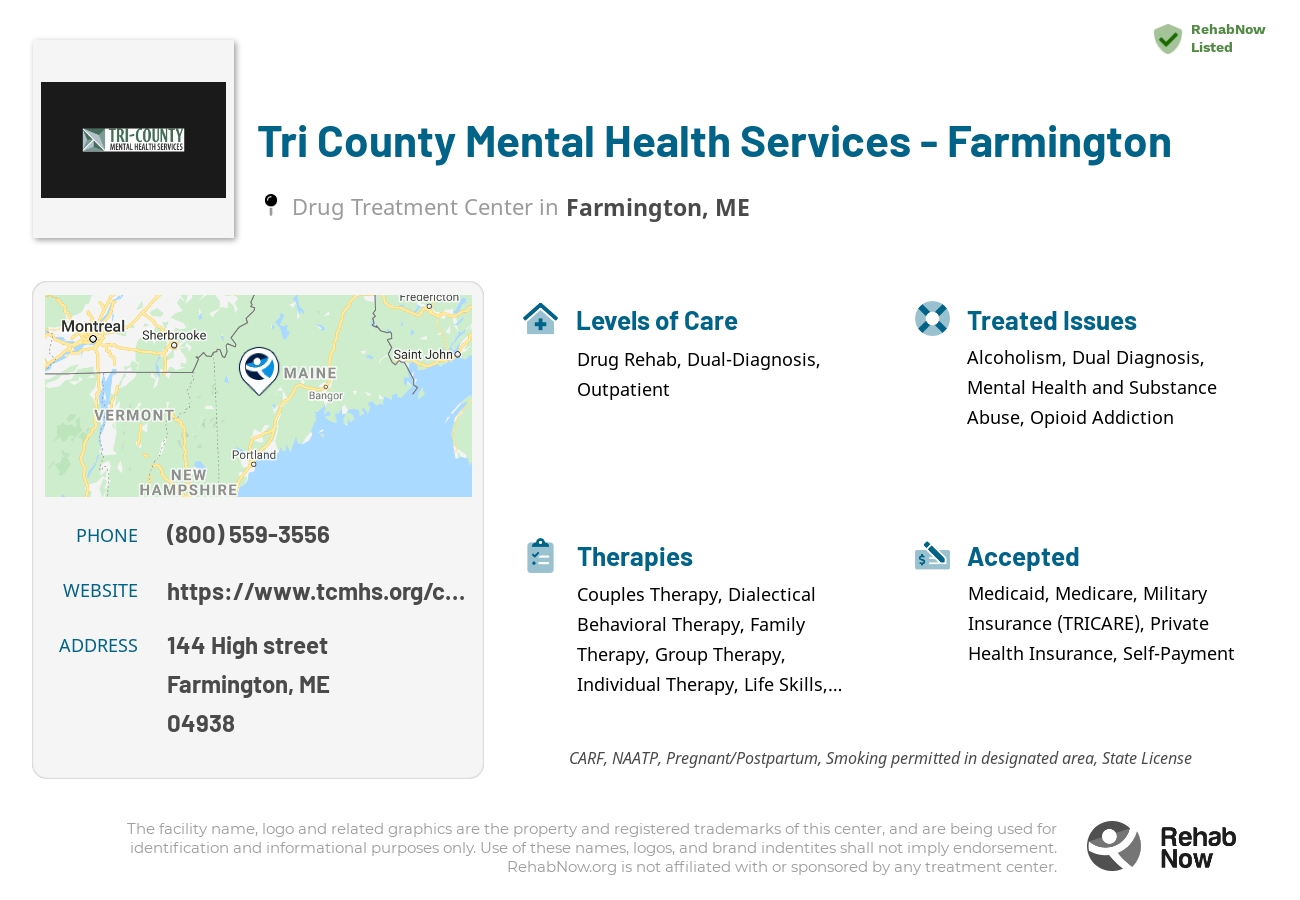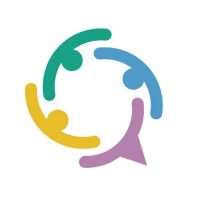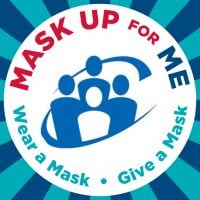Tri County Mental Health Services - Farmington
Drug Rehab Center in Farmington, Maine
Tri County Mental Health Services Farmington is an accredited multi-level mental health facility in Maine offering comprehensive evidence-based services and treatments for mental health, substance abuse, and co-occurring disorders.
About Tri County Mental Health Services - Farmington in Maine
Tri County Mental Health Services - High Street, located in Farmington, Maine, specializes in outpatient services catering to individuals grappling with mental health issues and substance addiction. This program is distinctive in its comprehensive approach, combining psychiatric services, medication management, group support, and trauma therapy to address diverse needs.
Accredited by the state and accepting private health insurance, Tri County Mental Health Services - High Street ensures its services are accessible and of high quality. The facility's affiliation with Tri County Mental Health Services reinforces its commitment to providing evidence-based care across various mental and substance abuse disorders.
- Offers a multifaceted approach to treatment including psychiatric services, group support, and trauma therapy to individually tailor care.
- Dedicated to treating a wide range of addictions and mental health issues, employing methods like dialectical behavioral therapy and family therapy.
- Supports recovery through various levels of care, including outpatient, residential, and community treatment options.
Specializing in addressing substance addiction such as opioids, drugs, and alcohol abuse alongside mental health conditions like depression and anxiety, Tri County Mental Health Services employs an array of treatment methods including DBT, group therapy, and medication management to support individuals on their path to sobriety.
Genders
Ages
Modality
Additional
Accreditations
State License
Conditions and Issues Treated
Substance abuse creates problems that affect people in Farmington, ME on many levels. First, substance abuse affects the individual who is abusing drugs or alcohol. This can result in health problems, including heart damage and overdose. Substance abuse also affects the user’s family, friends, co-workers, classmates, or peers. These people feel frustrated because they do not know how to help their loved ones struggling with addiction. At the same time, the addict cannot control his behavior. Lastly, friends and family members of addicts are affected financially by substance abuse.
The good news is that effective treatments can help prevent substance abuse or treat its effects on the user. These treatments, which include behavioral therapy and counseling sessions, target the underlying causes of substance abuse, helping users achieve sobriety so they can regain control over their lives. They also teach users to cope with stress in ways other than using drugs or alcohol.
Opioid addiction has become a significant health problem in the United States. When a person’s life becomes unmanageable because of an opioid addiction, treatment can help them get sober. Treatment includes medical care and counseling.
“With so many people struggling with opioid addiction, we need more care and attention for those who want to quit. Opioid addicts often take opioids when they experience a painful injury – that’s how the cycle starts! When someone begins taking their medication differently than prescribed or takes an excessive amount of drugs, it means they’re hooked on drugs and in danger of overdosing.
The most successful way to beat this is through detoxing from these types treatments at Tri County Mental Health Services - Farmington in . Most facilities start by using medical support during the process while providing counseling services; rehabilitation comes later on after treatment has been completed successfully.
A “dual diagnosis” is when the individual has two medical issues at the same time. The top co-occurring mental disorders with addiction are depression, anxiety, ADHD, bi-polar disorder. Addiction is also considered a mental illness that is not a choice but rather a medical condition. Addiction can be caused by any number of underlying issues.
Dual diagnosis is provided by Tri County Mental Health Services - Farmington to treat addictive tendencies as well as any untreated mental illnesses. This ensures successful long term health and recovery for patients after treatment has been completed.
Dual diagnosis is provided by Tri County Mental Health Services - Farmington to treat addictive tendencies as well as any untreated mental illnesses for people in Maine. This ensures successful long term health and recovery for patients after treatment has been completed.Levels of Care Offered
This center offers a variety of custom treatment tailored to individual recovery. Currently available are Drug Rehab, Dual-Diagnosis, Outpatient, with additional therapies available as listed below.
Outpatient programs at Tri County Mental Health Services - Farmington, the Farmington resident can live with their family while continuing with their job or studies. Treatment includes educating the patient on drug abuse, medications, and counseling sessions at the individual or group level. Outpatient treatment plans cover diagnosis, detoxification, management, and counseling. They are a popular option for those who have graduated from inpatient facilities.
Therapies & Programs
Individual therapy is a form of counseling where you meet with a trained professional one-on-one. Meeting with a therapist in this setting allows for a personal and trusting relationship to be built. This allows the patient to open up about sensitive or private issues they may not feel comfortable discussing in a group. Individual therapy helps identify the root causes of your addiction, which can help prevent relapse.
Couples therapy for drug addiction is a unique form of therapy that allows family members to work through the emotional issues of their loved one’s addiction together. Family members can support each other while learning how to cope with the addiction and encourage healthy changes. The two will work with a therapist to learn how the addiction affects themselves and the relationship.
Family therapy is often done alongside drug treatment to help addicts stay sober. The goal of family therapy for drug addiction is to create an environment where communication can happen without judgment, hostility, or blame. The therapist will sit with the family so they can learn how to communicate differently and provide new tools for dealing with emotions so that people don’t want to drink or do drugs. It’s important for families to focus on relapse prevention plans during treatment so that if the addict feels like they want to use again, they’ll know what steps they need to take together to prevent it from happening again in the future.
Group therapy sessions are another common addiction recovery service. These group sessions typically involve six to 12 addicts who meet regularly with a trained professional for support and guidance.
During these sessions, the group shares their experiences with one another and provides feedback that can help each member avoid relapse or overcome specific obstacles they are facing in their recovery process. With this type of support and guidance, addicts can feel like they are part of a community that understands their struggles and will help them get through the hard times.
Many people struggling with drug addiction have experienced some form of trauma in their lives. It is crucial that these individuals seek out professional help; otherwise, their drug abuse and addiction will likely continue.
Therapists and counselors at drug treatment centers employ several treatment programs to help people struggling with drug addiction, including trauma therapy. Trauma therapy helps people dealing with addiction by allowing them to confront the traumas of their past and move past them.
It is important to note that trauma therapy should not be confused with PTSD (post-traumatic stress disorder). Rather, it is used to treat the effects of trauma, which are often at the root of addiction.
Dialectical Behavior Therapy was developed in the 1980s to treat chronically suicidal individuals. It is a cognitive-behavioral therapy that combines standard DBT with strategies derived from Zen Buddhism, such as mindfulness training.
DBT has been adapted for use with other types of psychiatric problems, including eating disorders, substance abuse disorders, borderline personality disorder, posttraumatic stress disorder (PTSD), and other personality disorders. Dialectical Behavior Therapy is considered a psychosocial treatment of BPD. This means that while it can be used alone or in conjunction with drug treatments, DBT does not rely on medications to treat the disorder. Instead, DBT aims to help patients change their thinking and behavior.
Cognitive Behavioral Therapy (CBT) focuses on the underlying thoughts and behaviors that caused the problem of addiction in the first place and may cause a relapse. Negative feelings are common in drug abuse disorders, but they can lead to co-occurring disorders if not recognized. CBT involves strategies that help to change the behavior pattern by restructuring negative thoughts into positive ones. It helps to remove these feelings, and it provides long-term benefits. Also, CBT promotes self-awareness and self-control. It can be administered as a monotherapy or as part of combination therapy.
CBT can improve the patient’s mood, reduce drug cravings and boost success rates on treatment plans. Regular practice can help individuals handle negative attitudes, thoughts, and feelings without turning to drugs or alcohol. The core belief of Cognitive Behavioral Therapy (CBT) is that one’s moods, behaviors, and actions are all connected. Individuals can improve their quality of life using CBT. It helps addicts understand the patterns of thought and feelings that cause them to use drugs or alcohol and develop a healthy response.
It’s not as simple as quitting drinking or using drugs and expecting the hard part to be over. Many addicts in recovery have discovered that they need to improve skills such as time management, organization, communication, socialization, and self-esteem. Learning certain life skills can help those who are struggling with addiction.
Payment Options Accepted
For specific insurance or payment methods please contact us.
Is your insurance accepted?
Ask an expert, call (888) 674-0062
Tri County Mental Health Services Associated Centers
Discover treatment facilities under the same provider.
- Tri County Mental Health Services - Oxford in Oxford, ME
- Tri County Mental Health Services - Bridgton in Bridgton, ME
- Tri County Mental Health Services - Rumford in Rumford, ME
- Tri County Mental Health Services - Lewiston in Lewiston, ME
Learn More About Tri County Mental Health Services Centers
Additional Details
Specifics, location, and helpful extra information.
Farmington, Maine 4938 Phone Number(800) 559-3556 Meta DetailsUpdated April 15, 2024
Staff Verified
Tri County Mental Health Services - Farmington Patient Reviews
There are no reviews yet. Be the first one to write one.
Farmington, Maine Addiction Information
Prescription opioid abuse is the most common form of substance abuse in Maine. More than 10% of these residents have also admitted to using prescription drugs for non-medical purposes. Between 2013 and 2014, 4 out of every 5 deaths in Maine were caused by illicit drugs. One in five high school students in Maine uses marijuana every single month.
Farmington, ME, is grappling with a severe drug addiction problem. The problem is particularly severe for opioids. In 2016, there were 1,538 drug-related arrests in Farmington. The majority of those arrested were between the ages of 18 and 34. Since drug addiction is a chronic medical condition, it requires ongoing care and treatment. In Farmington, many local and nearby rehab centers can provide quality care for those struggling with addiction.
Treatment in Nearby Cities
- Madawaska, ME (205.4 mi.)
- Mechanic Falls, ME (40.5 mi.)
- Kennebunk, ME (91.1 mi.)
- Mexico, ME (21.0 mi.)
- East Machias, ME (135.7 mi.)
Centers near Tri County Mental Health Services - Farmington
The facility name, logo and brand are the property and registered trademarks of Tri County Mental Health Services - Farmington, and are being used for identification and informational purposes only. Use of these names, logos and brands shall not imply endorsement. RehabNow.org is not affiliated with or sponsored by Tri County Mental Health Services - Farmington.









